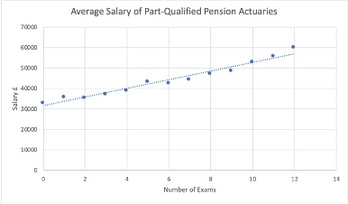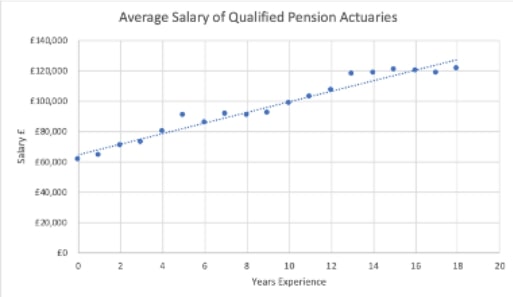Relaxation, vacation, or the development of new hobbies? A simple, stress-free lifestyle? All rely on one thing: your pension. But how much will you get? Is it secure? How can you maintain stability amidst uncertainty? The role of pension actuaries in the financial industry cannot be overstated; your future financial stability depends on them.
Pension actuaries are experts in the design, management, and analysis of pension programs, with a primary focus on ensuring financial viability. This helps retirees to relax knowing that they will receive the retirement benefits they were promised. It offers an interesting, diverse, and gratifying work path.
Learn More : https://theacademicjunction.co.in/
The Integral Role of a Pensions Actuary in Retirement Planning
Pension plans have two forms:
- Defined Benefit (DB)
- Defined Contribution
DB plans are employer-sponsored retirement plans. The employer (sponsor) bears the risk and is responsible for ensuring the plan has enough assets to meet its commitments (known as “Technical Provisions” (TP)). To guarantee sufficient assets, employers must make regular contributions.
DB schemes are governed through the appointment of trustees. A team of retirees, current employees, and professionals is in charge of ensuring members’ benefits are secure by agreeing on an acceptable contribution level to meet the projected TP.
Estimated
The operative word here. The future is unknown. Consider a thirty-year-old employee with thirty-five years until retirement. We don’t know how their pay will rise, how interest rates will fluctuate, or when they will die. So, how do we calculate TP? Appoint a ‘Scheme Actuary’. A pension specialist in charge of determining the overall value of the fund using actuarial assumptions.
Trustees and employers must agree on these assumptions. With a substantial conflict of interest, this can be difficult. Trustees favor conservative assumptions to ensure stability.
Sponsors prefer lower contributions. The scheme actuary must balance this influence by establishing an early engagement and demonstrating a desire to collaborate with both sides. To begin the discussion, we propose a basic set of actuarial assumptions.
The assumptions are based on five main categories
- Current Financial Conditions – Inflation rates, interest rates, etc
- Investment Strategy – Asset allocation decisions for various classes (e.g., equities, bonds, real estate, etc.). Low-risk solutions require a bigger monetary contribution from employers but provide a lower danger of shortfalls.
- The Employer Covenant – The sponsor’s financial ability to support the DB scheme now and in the future.
-
Population Demographics and Scheme Experience – Demographic assumptions center on current death rates and predicted increases in life expectancy. Since 2000, worldwide life expectancy has risen by five years. This is an essential topic to debate. Relying on essential facts such as member postcodes and pension size (the bigger the pension, the longer the life expectancy).
-
Requirement for Prudence – Pension scheme legislation requires that schemes are valued on a prudent basis.
The first proposition is critical. If early valuation estimates are made using overly cautious assumptions, they form a “anchor point” for trustee expectations. Having an impact on future decisions and making it difficult to accept any significant adjustments. To establish a realistic stance, pension actuaries must first analyze the affordability of any assumptions made by the employer. The scheme actuary’s responsibility is to foster excellent working relationships with the trustees and sponsors through effective communication abilities. This allows for positive negotiation of essential assumptions to reach a mutually acceptable contribution rate. To set reasonable expectations, employ a variety of strategies, such as providing the valuation on a best estimate basis.
Also Read : https://theacademicjunction.co.in/master-future-with-numbers-become-an-actuary/
What happens between these three years?
In recent years, trustees have implemented integrated risk management. Commissioning their advisers to assess major risks on a frequent basis and establish trigger points with predetermined actions if they are exceeded. These are regularly checked by actuarial risk software, which improves pension security by providing a better understanding of the risks. Following great performance, actions may include implementing a de-risking investing strategy or boosting the contribution rate when the sponsor’s credit rating has dropped.
Recently, pension actuaries have devised strategies to hedge against big risks by investing in financial derivatives. Opening up new opportunities for pension actuaries in the financial markets.

Despite the fact that the formal statuary role in DC pensions has been curtailed, actuaries continue to provide valuable services. While employees are responsible for ensuring that they have enough assets to satisfy their retirement needs, pension actuaries assist them in understanding, monitoring, and managing the risks associated with their DC pension. Using their experience, they can demonstrate the impact of various contribution levels, investment options, and pay-out phase management when establishing pension plans. The use of cutting-edge actuarial software enables this to be accomplished instantly.
All You Need To Know About Actuarial Science | The Academic Junction | By Silky Goyal
Beyond Mathematics: The Diverse Skill Set of a Pensions Actuary
Actuarial work provides a great balance between statistical work, report writing, and consulting. Communication is key. To quote Kristen Flynn a Pricing Actuary in Australia,
“There is a big misperception that actuaries are simply number crunchers. But the truth is, if you can’t use words to explain why the numbers matter, they won’t matter.”
Pensions require members to make some of the most critical decisions they will ever make, and they cannot afford to make mistakes. The ability to effectively communicate complicated concepts to your target audience distinguishes senior consultants from recent grads. An skilled actuary can easily translate complex financial analysis and modeling into jargon-free language that their client can understand and act upon.
It’s more than just effective communication and technical skills. To succeed, pension actuaries must possess a variety of soft skills. From leadership and adaptability to emotional intelligence. Scheme actuaries work alongside a multidisciplinary team, and knowing how to get the most out of your team is essential. This comes from strong leadership and working to each individual’s abilities to reach excellence results.
Also Read : https://theacademicjunction.co.in/indias-need-25000-actuaries/
Steps to Becoming a Pension Actuary

Step 1: Is this the right job for me?
Qualifying as a specialist pension actuary is a lengthy, difficult, but rewarding process. There are less than 9,000 qualified actuaries (FIA) globally, making it a tiny but highly qualified and trusted profession. It takes an average of six to eight years to qualify, so this is not a decision to be made lightly.
First and foremost, is being an actuary a good fit for you? Do you have great mathematical and statistical abilities? Capable of identifying and solving difficulties with high determination and willpower? Then this might be the profession for you!
The Institute and Faculty of Actuaries (IFOA) is the UK’s professional body for actuaries. They are in charge of approving the title “Fellow of the Institute and Faculty of Actuaries” (FIA). The road to becoming an actuary differs widely. Most start with a math-based degree and then work their way through the actuarial tests in a graduate role. But this is not the case for everyone. If you do not have a mathematics-based degree, you must first take the IFOA’s non-member entry exam.
An alternative is to pursue a university degree in actuarial science or financial mathematics and earn exam exemptions through certified courses. Exemptions recognise prior learning for students who have obtained a qualification equivalent to the exams. Undergraduate degrees can provide up to six exemptions. Obtaining exemptions is difficult, but it can save years off your qualifying time.

Step 2: Secure a graduate role as a trainee actuarial analyst.
Several crucial decisions must be taken at this point. Your employer’s size might have a significant impact on your career. Willis Tower Watson, Mercer, and Aon Hewitt are the three leading companies in the UK pension consultancy market. Each offers good chances and draws a large number of motivated candidates. They offer possibilities to:

- Learn from a variety of colleagues – Being a member of a broad team of professionals provides opportunities to learn from highly experienced colleagues. Offering group rotation programming to help individuals build excellent technical abilities. Working alongside a group of students studying for actuarial examinations will help you further your studies.
- Work with significant clients – Gain invaluable expertise by working on multibillion-pound pension schemes. Developing a strong CV.
- Travel – With client teams located all over the world, there are numerous prospects for international travel.
- Progress – Typically pays well and includes a generous study package. Clear career development charts provide more options to earn and learn.
Step 3: The Dreaded Exams
After landing a graduate position, the next step is to pass the tests. The actuarial qualification has two levels: associates and fellows. Associate actuaries have passed the core tests. This entails taking ten tests as well as two years of personal and professional development (PPD). All actuaries, regardless of their future specialty, take the same 10 tests.
Once an associate, the journey to specialization begins. This includes two topic principle (SP) tests, followed by a final specialist advanced subject (SA). You will earn your FIA qualification after one more year off PPD.
Specializing as a pension actuary entails taking SP4 Pensions and other benefits’ and one more SP test, usually SP5 ‘Investment and Finance’. SA4 ‘Pensions and other perks’ is your final test.
For more information, I recommend reading the IFOA’s outline of the path to become an actuary.
Enroll Now : https://theacademicjunction.co.in/
It’s a give-and-take situation, as is everything in life. Larger companies often require higher workloads, which affects work-life balance. In terms of career advancement, you should explore your possibilities rather than taking a one-size-fits-all strategy. Mid-size and smaller enterprises have their advantages:
- Improved work-life balance by focusing on a broader range of performance criteria rather than billable hours.
- A more intimate working environment – Smaller workforces facilitate getting to know teams. Creating a familiar working atmosphere facilitates the transition to the professional world.
- Faster route to seniority – Small teams have more possibilities to stand out by taking on more responsibility. Greater access to key stakeholders gives for more possibilities to create connections, which frequently leads to faster results.
Consider your job goals and priorities to find the best fit.
Step 4: Not Done Just Yet
After qualifying for the FIA Surely, I’m finished, right? Not quite yet. Scheme actuaries must hold the practising certificate (PC) ‘Scheme Actuary to a Pension Scheme’. Allowing them to offer actuarial services directly to the public. This guarantees that they uphold professional standards such as ethics, professionalism, and technical proficiency. Demonstrating the ability to do tasks of substantial public relevance.

There are four criteria required to achieve this certificate:
- Being a current fellow of the IFoA.
- Completing the UK Pensions Practice Module within two years of your application.
- Demonstrating a strong level of competency as set out in the competency framework by the IFOA. Including areas such as communication, leadership, accountability, and professionalism.
- Completing the Continuous Personal Development (CPD) requirements. Entailing thirty hours off CPD each year.
Congratulations, you can now practice as a scheme actuary, but don’t worry, the learning doesn’t stop here. Actuaries believe in lifelong learning and education, with limitless prospects for growth. A wide range of courses and qualifications are available, including a data science certificate and a climate and sustainability course. The need of staying current cannot be emphasized, given the ever-changing legislative and financial climates.
Career Opportunities for Pensions Actuaries: Pathways and Prospects
After qualifying for the FIA Surely, I’m finished, right? Not quite yet. Scheme actuaries must hold the practising certificate (PC) ‘Scheme Actuary to a Pension Scheme’. Allowing them to offer actuarial services directly to the public. This guarantees that they uphold professional standards such as ethics, professionalism, and technical proficiency. Demonstrating the ability to do tasks of substantial public relevance.

The industry is continually changing. Current fluctuating markets, a rising recessionary economy, and new regulations all contribute to a high level of uncertainty. Trustees and sponsors alike are looking to actuaries for help as they make difficult decisions. Increasing the demand for experienced actuaries.
Machine learning and artificial intelligence (AI) applications are driving further advancements in actuarial technology. This has enabled advanced systems to blend actuarial models with automated data to improve risk management. This leads to intriguing opportunities for new grads. With a unique opportunity to integrate actuarial subject matter expertise with cutting-edge data science tools and approaches.
The transition from Excel to coding languages such as R or Python has created opportunities for a new generation of actuaries to capitalize on the data revolution and develop new and improved solutions to existing challenges. This involves AI-powered data collection, the application of machine learning to detect previously unknown trends and linkages, and optimizing the prediction capacity of valuation models. Overall, this has created a highly stimulating workplace for the best and brightest among us.
The sector also faces numerous hurdles. Most significantly, the decline of defined benefit pension programs. In the United Kingdom in 2012, there were 7,297 schemes. This has dropped substantially over the last ten years, to just 5,522 in 2021, a 24% decrease, leaving long-term doubt about the future of scheme actuaries. However, given their knowledge in investments and risk management, they have a significant chance to transition from traditional jobs to new areas such as banking and enterprise risk management (ERM).
Pensions Actuary Salary Insights: Understanding Earning Potential
Pension actuaries are well compensated. It’s not a secret. This indicates their high degree of skill and responsibility, placing them among the highest-paid individuals in the financial industry. Let us take a closer look:
Actuarial salaries are based on three primary factors:
- Level of Experience
- Exam number and contracted office location
First, let’s examine at partially qualified pension actuaries. Exam progress is the limiting factor. A part-qualified actuary with 25 years of experience or twelve tests earns an average income of £60,000. Salaries rise sharply as exams advance. Doubling from zero to twelve tests. The graph illustrates the effect of years of expertise. After ten years of not completing all of the examinations, the average salary levels off at £60,000. Contracted office location is strongly related to salary. This can result in a 44% variation. Belfast has the lowest average pay at £37,013, whereas England and Scotland (excluding London) average £45,185. London has the highest average salary, at £53,282.

With exams out of the way, years of experience become the largest salary driving force. Doubling from £61,312 to £120,506 in the first 15 years. An annual increase of nearly £4,000. While also depending on a wide range of other factors including:
- People management
- Scheme Actuary
- Responsibility for generating new business

Each of these factors can cause the average salary to increase by around 16%.
92% of pension actuaries receive an additional performance-related bonus of which 64% is greater than 10% of their salary.
Conclusion
In conclusion, navigating the complexities of pension planning and management requires expertise and insight, which is where pensions actuaries play a pivotal role. Through their rigorous analysis and forecasting, pensions actuaries provide invaluable guidance to individuals and organizations alike, ensuring the sustainability and security of retirement funds
Pursuing a Rewarding Career as a Pensions Actuary
Pension actuaries are the underappreciated heroes of retirement planning. They continue to provide financial stability and security for millions of people. Their position is critical in the financial industry. Being responsible for a fund’s financial stability is a difficult undertaking. They must balance the authority of trustees and sponsors. Pension actuaries are qualified for the job due to their strong technical and soft abilities.
Opportunities for the future are constantly evolving. Using advanced actuarial tools and developing risk-management strategies has created new opportunities for pension actuaries in the financial markets. Creating interesting opportunities for this small profession.
Being a pension actuary is difficult but rewarding, necessitating effort and long-term commitment. But, where would we be without them?
Visit Now : https://theacademicjunction.co.in/


